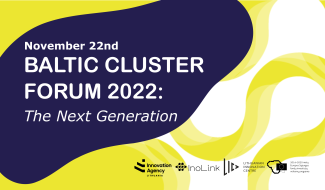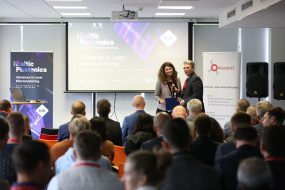Clusters aid business while facing a crisis

Business start counting huge losses due to the restrictions announced in the wake of the COVID-19 epidemic internationally. Large, medium-sized and small Lithuanian enterprises have already been hit by the crisis as well. If companies were hesitating to benefit from clustering so far, the quarantine caused situation illustrates the value of this network for the rapid flow of relevant information. Coordinators of Lithuanian business clusters have shared their views on the current situation retaining professionals and the business itself.
According to Giedrius Bagušinskas, the President of the Lithuanian clusters network and the Coordinator of SMART FOOD cluster, for companies, every cluster now is a window to other sectors and state institutions. And it is a window for clusters to a specific sector as well. In the face of the crisis, business cluster coordinators have become particularly important in the context of a wide range of contacts with authorities. They promptly obtain information, inform the public authorities of the situation and offer the solutions needed for the specific sector. Coordinator of the National Food Cluster (NaMŪK) dr. Česlovas Bobinas says that communication has already reached the level of Lithuanian Cluster Network, in order to respond in a coordinated and timely manner to current challenges and to apply solutions already proven in other companies.

Giedrius Bagušinskas
Coordinator of the Vilnius Film Cluster Romanas Matulis currently represents the interests of not only the cluster but also the whole Lithuanian audiovisual industry. Representatives of the cluster participate in meetings of various ministries’ working groups, collect and analyze information on the impact of the pandemic crisis on each cluster company. With the help of lawyers, the cluster advises its members on issues regarding employee retention, companies’ liquidity provision and performance of contracts due to extreme conditions. This week members of the Lithuanian Automotive Export Association (LAuGEA) are consulted by financial specialists online. “We have questions about paying value-added taxes, working capital, and interest compensation. To sum up, we aim to properly manage the challenges ahead,” says cluster Coordinator Dr. Andrius Rakickas.
Surprised by the unexpected speed of the crisis
When asked about cluster members’ preparedness for the crisis, all the cluster coordinators mentioned the main surprise – the lightning speed of the crisis. “Lithuania has been tough on challenges. Our business executives have experienced more than the ones in Western or Scandinavian business, but no situation has changed that dramatically in a week before. Key issues remain the same in every company: retention and redundancy, issues in logistics and supply chain, dealing with contagion. Moreover, some companies were also affected by due to declining oil price falling value of the Russian ruble or the pound,” says G. Bagušinskas.
The coordinator of the Lithuanian Automotive Export Association estimates that the cluster companies were moderately prepared for the crisis. Although there have been few signs of widespread economic damage since the beginning of the year, however, no one predicted it can develop so fast. “The smaller the company is, the more vulnerable it gets. The key question is how to retain the employees? The least painful solutions are sought: leave is offered, some employees have sick leave certificates for childcare, but in some companies downtime is inevitable”, says Dr. A. Rakickas.

dr. Andrius Rakickas
Comfort goods producers affected the most in the food sector
“The first impression that the food sector has the least problems is inaccurate,“ says the Coordinator of the SMART FOOD cluster. “The basic product basket remains the most in-demand as usually during crises, but the demand for other products has fallen dramatically. The orders from foreign markets are being canceled and online commerce stalled because suppliers were not ready for such a drastic change in the market.”
Large enterprises in the food sector have suffered fewer losses as consumers are currently buying more of their products. According to dr. Č. Bobinas, less damage is done to large enterprises than small or medium-sized manufacturers. They are exposed to risks in the material supply chain, meanwhile, small business have almost stalled at all. There is no demand for their production at the moment and the existing sales channels for non-essential food products have closed. The only alternative channel is e-commerce, but it still lacks the experience.

dr. Česlovas Bobinas
The difficult situation of the audiovisual industry
With the closing of the cinemas, the organizers of the annual Vilnius film festival “Kino pavasaris” have had 4 days to change their concept and become the first online cinema festival in Lithuania. Festival movies are currently being streamed online, but the festival will still loose several hundred thousand euros. After Lithuania was placed under quarantine restrictions, all events, film, and advertising production orders were cancelled, the filming of both international and local projects has stopped. This had a profound effect on the Vilnius Film Cluster. Most members have lost 80-100% of their income. “The situation across the sector is catastrophic. The cluster members currently are counting the direct loss of 6 million euros. By the end of the year, we predict a 50% overall revenue decline in the sector, compared to 2019. We will not be able to survive without the state aid,” says Romanas Matulis, the Coordinator of the Vilnius Film Cluster.
Business model changes have succeeded not everywhere
Renata Giliene, the Coordinator of the Dental Innovation Cluster, says that the restrictions have put an end to everything: manufacturing, marketing, and treatment. All the members of the cluster are more or less involved in treatment services, so in the face of the crisis, the business model has not changed, except for the cluster-owned training company that has started lecturing online.
Meanwhile, some life science companies, immediately after becoming aware of the COVID 19 outbreak in China, adjusted their business model to upcoming challenges. For example, the activities of JSC “Satimed” are related to applying biotechnology and life sciences in the field of public health, therefore the demand for their products has increased and their involvement in R&D activities is essentially important for science.
Some companies still have outstanding orders
Coordinator of Lithuanian Automotive Export Association dr. A. Rakickas points out that all employees are healthy in their cluster business for now. Larger companies have work shifts, so in need, quarantine would not apply to everyone, but only to those who had contact with an infected individual. The situation would be completely different for small and medium-sized enterprises working one shift. Quarantining would have to stop them at all.
When asked about the orders, the Coordinator notes that the situation within companies varies. Although most of the cluster business are exporting companies, production logistics presently does not meet any additional difficulties. A rising problem is the lack of new orders. Part of orders made by members of the association with production deadlines of more than a few weeks are due from earlier. If employees do not quarantine, orders will be delivered. However, there is a question about the profitability of existing orders as commodity prices have soared lately. If the warehouses are out of raw materials, the cost of producing new orders will be significantly higher. “The cluster companies that produce chemical products have additional opportunities to supply disinfectant fluids to the market. However, the risk of demand management has also increased: the future demand is still unclear, the price of raw materials can change, as, for example, the price of alcohol has increased 6 times,” says dr. A. Rakickas.
“Most of the companies in the Lithuanian plastics cluster are busy at the moment, but things are changing at such a pace that it is difficult to predict what will happen in the next few months. We predict a decrease of orders, so companies will have to reduce not only production but working hours as well or post downtime at all,” says Darius Lasionis, Coordinator of the Lithuanian Plastics Cluster and Director of the Lithuanian Engineering Industry Association LINPRA. Most people in the administration work remotely, other staff work at a distance of at least 1-2 meters, but the risk remains high despite disinfecting spaces and surfaces in the factory.
Even troubled itself business support the healthcare staff
In response to this situation, initiative clusters not only look for solutions to save their business but also take social initiatives. Confectionery factory Rūta delivers its products for large hospitals. Company Daumantai LT granted financial support to the local hospital and primary health care center. Members of the Dental Innovation Cluster donated 10,000 EUR to the Health Care Fund and TV3 Assistance Fund each. The Lithuanian Automotive Export Association is supporting the hospital and sends its produced disinfectant. The companies of the Vilnius Film Cluster, together with the Visoriai Information Technology Park, are developing an initiative for the short film’s production providing essential behavior under quarantine. JSC Dansu, which is part of the same film cluster, has bought a lung ventilator to a medical institution. Several initiatives are taken by individual cluster companies without any advertising.
The value of cluster community
“Currently most of the clusters operating in Lithuania are actively communicating in their sector and with state institutions. Besides, the Lithuanian cluster network participates in the European Cluster Network and exchanges information with counterparts in other countries and representatives of the European Commission,” states Gintas Kimtys, the temporary Director of the Agency for Science, Innovation and Technology (MITA).
All the clusters, represented by the coordinators in this article are involved in the InoLink project. It is a project of the EU instrument Inogeb LT, implemented by the Science, Innovation and Technology Agency (MITA) in cooperation with the Lithuanian Innovation Center. The project aims to promote the clustering of companies, increase cluster maturity, promote growth and international cooperation. The project and its activities are funded by the European Regional Development Fund.



